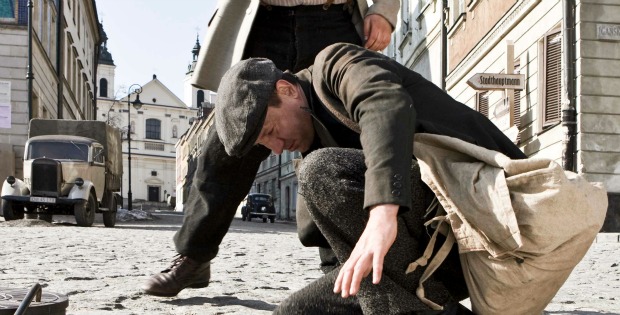In Darkness
Brutal, dank, disturbing, devastating, sickening and also pretty scary – it's about the Holocaust, yes, but not quite as expected.
Plot summary
One day Leopold encounters a group of Jews trying to escape the liquidation of the ghetto and agrees to hide them for money in the labyrinth of the town's sewers.

Brutal, dank, disturbing, devastating, sickening and also pretty scary – In Darkness is a film about the Holocaust, yes, but not quite as expected.
It is based on Robert Marshall’s book In the Sewers of Lvov, which chronicles the true story of Polish sewer worker Leopold Socha, who risks execution to hide a group of Jews for 14 months until the war ends. There are good performances all round as petty thief Socha (Robert Wieckiewics) initially agrees to help Mundek (Benno Fürmann) and his fellow Jewish companions after their escape from the ghetto in exchange for a daily payment. But as the Jews’ money inevitably runs out, Socha becomes less interested in the business arrangement and sacrifices more and more to keep them hidden and alive.
No stranger to the subject, director Agnieszka Holland’s 1990 film Europa, Europa concerned a Jewish boy who joined the Hitler Youth to escape detection. However, Holland said she was attracted to Marshall’s book as its sewer-setting avoided the usual, if entirely understandable, preoccupation with scenes of war, death camps, and homicidal Nazis barking orders. This is centralto the film’s success, as it is able to depict the everyday horror of random humans thrown together in cramped conditions and forced to cooperate in order to survive.
As a result, although far from being raunchy, there’s actually rather a lot of sex in the film. In the ghetto one night, a man quietly gets his end away with his mistress on the floor either unaware or unfazed that in the bed next to him his wife and young daughter are watching on in silent horror, unable to sleep or turn away. When these regular night time activities continue later in the sewers, some silent onlookers are even inspired to quietly seek solitary sexual relief. It is as shocking as it sounds precisely because such scenes are of much more understated horror – they aren’t punishments or beatings directly meted out by Nazis, but everyday emotional torment that their victims are forced to mete out on each other as a result of their horrific situation.
Indeed, while the threat of being discovered is ever present and there are flashes of execrable Nazi activities above ground, the physical brutality more commonly seen in Holocaust studies are not the main sources of horror here. By setting In Darkness exactly as its title describes, Holland arguably has an angle from which to show even more devastating inhumanity. After all, what could be more un-human than existing alongside rats in a cramped, gloomy cesspit? Yet Holland also manages to steer clear of sentimentality and lets a natural sense of human spirit and resilience shine through.
Still, the intensity of the ever-present fear in its murky surroundings means In Darkness actually owes far more debt to horror movies such as The Descent and 28 Days Later than, say, Schindler’s List or The Pianist. But couple this with the unavoidably stark realism you would expect from a true holocaust story and you get a pretty harrowing experience. This is typified in one of the first scenes, in which a group of terrified, naked women are shown running through a forest. The sight of these pale, ghostly bodies is chilling – far more so than that of the gun-toting Nazis shepherding them to their deaths.
It is fully deserving of its Oscar nod, but In Darkness doesn’t feel like a masterpiece. Perhaps because the number and sheer detail of the horrific incidents along the way threatens to engulf the film, preventing it flowing as smoothly as it could. And while Wieckiewicz is convincing as the self-interested Socha at the beginning, and also as the selfless, heroic Socha towards the end, the journey between feels unexplored. Very little is known of the real-life Leopold Socha, and despite the artistic licence here, he stills feels a rather opaque character.
There is a telling line at the end when the survivors finally emerge from the sewers to a newly-liberated Lvov. One scared young boy says: “Mummy, I want to go back.” While it is possible to understand this Stockholm syndrome-like reaction, it is extremely hard to sympathise with it. This is not a film you will be in a hurry to see again, but none the worse for it. Just plan something fun for afterwards.











COMMENTS